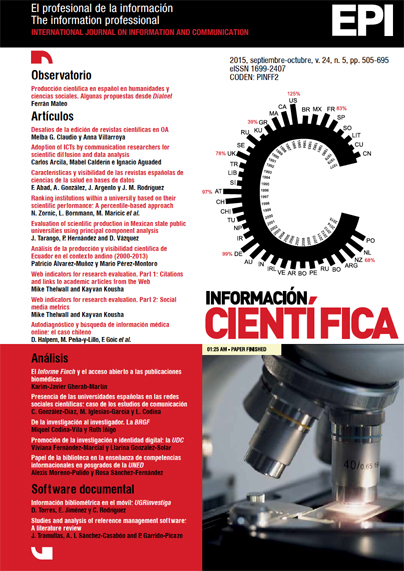Evaluation of scientific production in Mexican state public universities (2007-2011) using principal component analysis
DOI:
https://doi.org/10.3145/epi.2015.sep.06Keywords:
Scientific production, Principal component analysis (PCA), Institutional competitiveness, Index of relative potential, State public universities, Mexico.Abstract
This article focuses on the application of the principal component analysis (PCA) method to evaluate the competitiveness of scientific production in Mexican universities, based on the identification and classification of a set of indicators, grouped into seven dimensions and 18 criteria. Specifically, the method was performed in the educational institutions included in the category of state public universities (33 in total), over a period of five years (2007-2011), and ultimately identified only seven criteria as principal components, resulting in a scale of positions that indicate the index of relative potential (IPR in Spanish). Thus, the levels of opportunity for each university in relation to their group are defined, and the university that showed the highest competitiveness is identified and it in turn becomes a quality parameter.
Downloads
Downloads
Published
How to Cite
Issue
Section
License
Dissemination conditions of the articles once they are published
Authors can freely disseminate their articles on websites, social networks and repositories
However, the following conditions must be respected:
- Only the editorial version should be made public. Please do not publish preprints, postprints or proofs.
- Along with this copy, a specific mention of the publication in which the text has appeared must be included, also adding a clickable link to the URL: http://www.profesionaldelainformacion.com
- Only the final editorial version should be made public. Please do not publish preprints, postprints or proofs.
- Along with that copy, a specific mention of the publication in which the text has appeared must be included, also adding a clickable link to the URL: http://revista.profesionaldelainformacion.com
Profesional de la información journal offers the articles in open access with a Creative Commons BY license.




